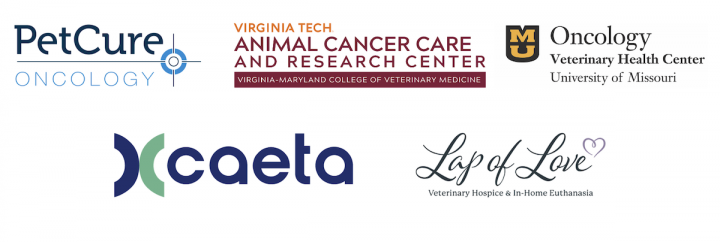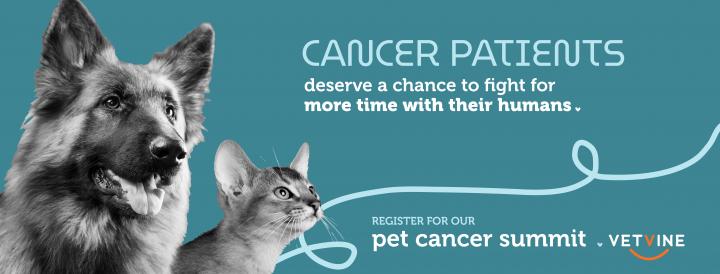
Program Details:
Session 1: The Current Thinking About What "Cancer" is and its Possible Causes
View On Demand (running time: 1 hr 20 mins)
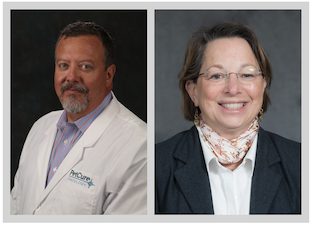
- G. Neal Mauldin, DVM, DACVIM (SAIM, Oncology), DACVR (RO)
- Lauren Trepanier, DVM, PhD, DACVIM, DACVCP
Cancer is a term that is often shrouded in uncertainty and fear, but gaining a clear understanding of what it is can make a significant difference in how we approach and manage the disease.
In this first session of an 8-part series on the topic of companion animal cancer we will create an understanding of what cancer is, the shift in how we are defining cancer, and a few of its possible causes.
There has been a paradigm shift and an effort to redefine and treat cancer as a chronic disease. Dr. Neal Mauldin will begin our program and help us understand how veterinary oncologists are currently thinking and talking about cancer as a disease process. “Cancer” is not necessarily an imminent death sentence and advances in cancer care are allowing our dogs and cats aspire to normal lifespans like any other chronic disease.
He will introduce us to some of the advances in technology that are readily available that have fewer side effects and result in better outcomes for cancers that affect dogs and cats. He will then discuss the important role of the immune system and immune effects to combat cancer, and the fine line between its helpful and harmful effects.
There are ongoing efforts in many arenas to investigate a number of possible factors that contribute to the development of cancer in dogs and cats. Dr. Lauren Trepanier, a veterinary internal medicine specialist and clinical pharmacologist – will discuss some newer information about the impact of environmental chemical exposures and the risks of bladder cancer and lymphoma in dogs. She will outline specific questions that should be asked of owners of dogs diagnosed with cancer, and the current evidence-based advice for preventing bladder cancer and lymphoma in dogs.
Register for just Session 1 or the Summit
Session 2: Cancer and Diagnostics - What is all hype? What is actually helpful? What truly offers hope?
View On Demand (running time: 1 hr 20 mins)
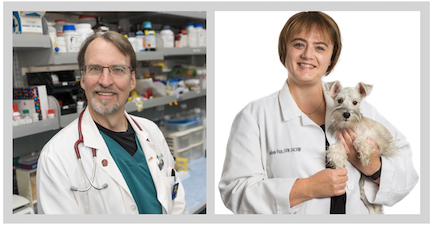
- Douglas Thamm, VMD, DACVIM (Oncology)
- Chelsea Tripp, DVM, MS, DACVIM (Oncology)
The mention of 'cancer' can evoke a wide range of emotions ranging from fear to concern to confusion. Understanding the diagnostic process and the spectrum of care available is essential to determining the best path forward for an individual family and their pet.
A wide array of diagnostic tests have emerged in the marketplace in recent years - all in an effort to support our ability to diagnose various cancer types in companion animals. Some have even come to market with little scientific rigor to support their utility. So, how are primary care veterinarians and pet owners to discern the best path forward? What is hype, what is helpful, and what truly offers hope?
Dr. Thamm will kick off this session discussing several new cancer diagnostic tools that caretakers should know about including: custom tumor-specific prognostic panels, blood-based screening tests, chemotherapy sensitivity tests, and DNA mutation-based testing. He will explain how and when to use these tests, and will highlight which are useful and the types of cases that might benefit from their use.
We will then turn our focus to the diagnostic approaches for lymphoma patients. Dr. Tripp will detail the tests that are available (flow cytometry, PARR, IHC, and ICC stains) and explain how primay care veterinarians can set patients up for success prior to referral to a veterinary oncologist.
Register for just Session 2 or the Summit
Session 3: Treating Cancer - It's not just limited to "chemo" or "radiation"
View On Demand (running time: 1 hr 49 mins)

- Chelsea Tripp, DVM, MS, DACVIM (Oncology)
- Timothy Fan, DVM, PhD, DACVIM (SAIM, Oncology)
- Jeffrey Bryan, DVM, MS, PhD, DACVIM (Oncology)
- Douglas Thamm, VMD, DACVIM (Oncology)
There are different approaches to cancer treatment and, for some types of cancer, the therapy may be individualized (precision medicine) based on information specific to the affected patient. This segment will delve into the wide array of treatment options that have emerged in the world of cancer care.
Dr. Chelsea Tripp will kick off this segment discussing some newer advancements in care that have fewer side effects than traditional IV chemotherapy. She will introduce us to novel therapies in cancer care such as Gold Nanoparticles and Stelfonta® and explain their applications in treating pets with cancer.
Dr. Tim Fan will expand on the discussion of how we can reduce the systemic toxicity associated with chemotherapy by directly and locally treating a tumor. He will highlight malignant melanoma of dogs as an example. He will describe a novel anchoring strategy for retaining potent anti-tumor cytokines to their location of injection, thereby exerting potent immune-activating properties locally. He will share results of a trial utilizing this method for treating dogs with malignant melanoma.
We will then turn our attention to learning about several other specific therapies and their indications for treating pets with cancer. Dr. Jeffrey Bryan will begin by explaining the role of genetics and epigenetics as it relates to tumor cells and how these can be modified or targeted with specific drugs. He will explain how the immune system interacts with tumors and their microenvironment and how that contributes to the destruction of cancer cells.
We also have another exciting addition to our armament for cancer care. Dr. Doug Thamm will introduce us to immune checkpoint inhibitors and explain how these agents can be used alone and in combination with other forms of cancer treatment. He will highlight which dogs stand most to benefit with this type of therapy.
Register for just Session 3 or the Summit
Session 4: Osteosarcoma and Hemangiosarcoma
View On Demand (running time: 1 hr 50 mins)
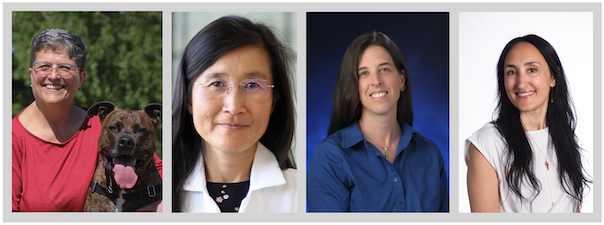
- Karri Meleo, DVM, DACVIM (Oncology), DACVR (RO)
- Joanne Tuohy, DVM, PhD, DACVS (Small Animal), ACVS Fellow in Surgical Oncology
- Erin Dickerson, PhD
- Antonella Borgatti, DVM, MS, DACVIM (Oncology), DECVIM-CA
Osteosarcoma and hemangiosarcoma are two fairly common types of cancer to affect dogs. Historically, both tumor types have been associated with poor long-term prognoses, however those beliefs are based on older information. Recent advances in cancer diagnostics and treatment are transforming the options we have for caring for dogs affected with these two diseases and outcomes.
We will begin this session discussing osteosarcoma – a malignant and aggressive cancer of bone. In years past, therapy was considered limited to limb amputation followed by chemotherapy however our approach to these patients has evolved to include other considerations.
Dr. Karri Meleo, a board certified medical and radiation oncologist, will begin the discussion talking about non-invasive radiation therapy and stereotactic radiation therapy for dogs with bone tumors, and how it is employed for palliation or with a curative intent.
Dr. Joanne Tuohy, a board certified veterinary surgeon and Fellow in Surgical Oncology, will then fold in a surgeon’s perspective on this disease and will discuss the role of a veterinary limb salvage, novel tumor ablation approaches for primary and metastatic osteosarcoma, and some combination therapeutic approaches to improve patient outcomes.
The second half of this session will concentrate on hemangiosarcoma in dogs. We will hear from two researchers at the University of Minnesota about our current understanding of hemangiosarcoma and what we can do about it ... now!
Drs. Erin Dickerson and Antonella Borgatti will create an understanding of the distinct subtypes of hemangiosarcoma and how these impact survival and responses to treatment. They will also update us on current accepted treatment approaches and debunk myths about all of the others. Lastly, they will inform us about clinical trials and how the results are paving the way to new and improved therapies for canine hemangiosarcoma.
Register for just Session 4 or the Summit
Session 5: Head and Neck Cancers of Dogs and Cats
View On Demand (running time: 1 hr 27 mins)
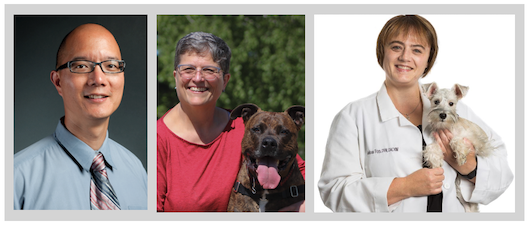
- Timothy Fan, DVM, PhD, DACVIM (SAIM, Oncology)
- Karri Meleo, DVM, DACVIM (Oncology), DACVR (RO)
- Chelsea Tripp, DVM, MS, DACVIM (Oncology)
In this session we will discuss some of the more common head and neck cancers affecting dogs and cats with an emphasis on current treatment options.
Oral squamous cell carcinoma is an aggressive and invasive form of cancer. It is the most commonly reported oral tumor of cats and the prognosis is usually poor. In this segment Dr. Tim Fan will describe a novel treatment option to treat affected cats. He will discuss results of a treatment trial of 30 cats with oral squamous cell carcinoma utilizing combination therapy of small molecules with stereotactic radio surgery.
Dr. Karri Meleo will then discuss the role of radiation therapy for treating oral tumors including malignant melanoma in dogs, nasal tumors in dogs and cats, and some lesser common cancers including nasal planum squamous cell carcinoma in dogs and cats.
Finally, we will learn about a novel cancer treatment option that’s available for treating some types of cancer. Dr. Chelsea Tripp will introduce us to electrochemotherapy and its applications for treating cutaneous tumors (skin tumors of the head and neck) as well as epulides, nasal tumors, and melanoma.
Register for just Session 5 or the Summit
Session 6: Supporting the Cancer Patient: Managing cancer pain, nutritional needs of patients, and supporting the caregiver through it all
View On Demand (running time: 1 hr 18 mins)
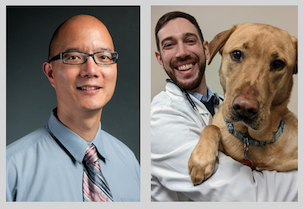
- Timothy Fan, DVM, PhD, DACVIM (SAIM, Oncology)
- Matthew Arkans, DVM, DACVR (RO)
Aside from the plan prescribed to treat a pet’s cancer, we have to ensure that we are addressing a number of factors that contribute to a pet’s quality of life and their overall health and wellbeing. In this session we will highlight several important aspects of supportive care for the cancer patient.
Bone cancer (osteosarcoma) is a painful disease. Dr. Tim Fan will create an understanding of the basic physiology of pain and then turn the focus to its generation when associated with malignant bone tumors. Specific therapeutic strategies for managing osteosarcoma pain will be highlighted.
Dr. Matt Arkans will then expand on the discussion of pain management including the role of physical therapy, other integrative modalities (laser therapy and acupuncture), sleep management and some newer pharmacologic approaches to pain management using ketamine and medicines like Solensia and Librela. He will address the importance of nutritional care of patients and support of caregivers related to cancer treatment logistics and end-of-life decision-making.
Register for just Session 6 or the Summit
Session 7: Dispelling Cancer Treatment Myths and Addressing Quality of Life of Affected Dogs and Cats
Weds, December 11, 2024 @ 7:30p ET / 4:30p PT View Other Time Zones
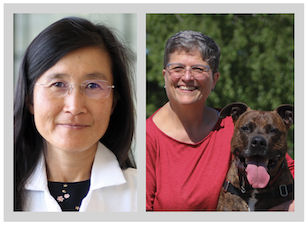
- Joanne Tuohy, DVM, PhD, DACVS (Small Animal), ACVS Fellow in Surgical Oncology
- Karri Meleo, DVM, DACVIM (Oncology), DACVR (RO)
Cancer is a word that can evoke a lot of fear and uncertainty, especially when it affects our animal companions. Owners want to make the best choices for their pet, but misinformation and myths can often cloud their judgment and complicate the path to effective treatment.
In this webinar, we’re going to cut through some of the confusion and address common myths about pet cancer and its treatment. We'll also address issues pertaining to cancer care and impacts on quality of life.
Dr. Joanne Tuohy, a veterinary surgeon and Fellow in Surgical Oncology, will address myths surrounding osteosarcoma therapy and quality of life. Her discussion will include the evaluation of a canine patient for limb amputation, common myths about factors that determine a patient's suitability for a limb amputation, the utility of physical rehabilitation in the recovery after limb amputation for some dogs, and expected quality of life after osteosarcoma therapy (surgical and chemotherapy).
Dr. Karri Meleo - a board certified medical and radiation oncologist - will then address myths related to chemotherapy and radiation therapy and how side effects can be minimized.
In addition to this live and interactive session, we will also have a continuation of the discussion on quality of life and end of life considerations for cancer patients and their families. This will be available for viewing On Demand. Dr. Kathleen Cooney - a certified veterinary hospice and palliative care veterinarian, end-of-life expert, and Diplomate of the American College of Animal Welfare - will provide some additional guidance on how to assess the quality of life of cancer patients and how to speak with caregivers when it comes to end-of-life decision making.
Register for just Session 7 or the Summit
Session 8: Pet Cancer Clinical Trials and Emerging or Novel Therapies
Weds, December 18, 2024 @ 7:30p ET / 4:30p PT View Other Time Zones
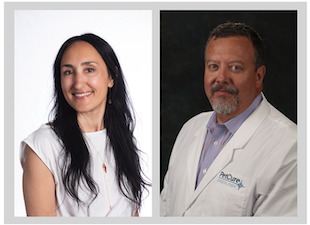
- Antonella Borgatti, DVM, MS, DACVIM (Oncology), DECVIM-CA
- G. Neal Mauldin, DVM, DACVIM (SAIM, Oncology), DACVR (RO)
Clinical cancer research trials are typically designed to examine the effects of a proposed intervention on the health outcome of the patients enrolled in the study. Owners commonly seek out clinical trials for pets who have failed to respond to traditional therapies or whose prognoses are poor with current standards of care. These studies often evaluate the efficacy of emerging, novel therapies for treating disease.
This session will focus on clinical research trials and how they are shaping cancer care. Dr. Antonella Borgatti - a veterinary oncologist and Director of the Clinical Investigation Center at the University of Minnesota - will create an understanding of clinical trials and highlight breakthroughs in oncology that have stemmed from clinical trials, including emerging immunotherapy approaches as well as eBAT for combatting canine hemangiosarcoma.
Dr. Mauldin will then turn the focus of discussion to some specific emerging or novel therapies showing promise for combatting cancer. He will highlight tumor vaccines and their use as an adjunct to radiotherapy for treating cancer, he will reveal some newer targets and applications of radiotherapy, a new therapy for combatting canine B-cell lymphoma (LDRHBRT), he will describe liquid fiducial markers and how they can enhance treatment outcomes, and he’ll describe the evolution of radiotherapy and some newer platforms transforming cancer care in dogs and cats.
Register for just Session 8 or the Summit
Registration includes:
- Admission (Live, online webinar +/- access to video recordings On Demand through 1/31/25*)
- Digital packet with helpful information and resources
Individual Session Registration Fee:
Non-Veterinarians - $18 per Session (not eligible to earn CE credit)
Veterinarian & Veterinary Technicans - $36 per Session (eligible to earn up to 1.25 hrs of CE credit per Session)
Summit Registration Fee (8 sessions):
- $59 - Non-CE credit eligible or
- $179 - CE credit option - earn up to 10 hrs of RACE-approved CE credit**
*FREE for VetVine Premium Membership subscribers;
Premium Membership subscribers will have ongoing access with an active subscription.
**This Program is approved for up to 10 hours of CE credit for veterinarians and veterinary technicians by AAVSB RACE, NY State, and the NJVMA.
This Program is brought to you by VetVine
in partnership with:
